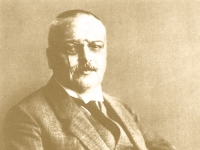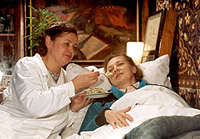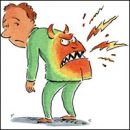What is the cause of Alzheimer's disease, is there any disease prevention, which are the early signs of the disease, characteristic symptoms, methods of diagnosis and treatment.
Content
- Symptoms and signs of Alzheimer's disease
- Alzheimer's Disease Diagnostics Methods
- Prevention and treatment of Alzheimer's disease
 German Psychiatrist Alzheimer 108 years ago described a new disease, giving him his last name. He revealed a new pathology of dementia, which has a treatless degenerative character. Now she is familiar to the world called «Alzheimer's disease».
German Psychiatrist Alzheimer 108 years ago described a new disease, giving him his last name. He revealed a new pathology of dementia, which has a treatless degenerative character. Now she is familiar to the world called «Alzheimer's disease».
A clear reason causeing Alzheimer's disease to date never detected. And this is the stronger that no one is insured against the possibility of ill. There are many hypotheses according to which the disease depends on the influence of various factors, but as long as they do not have clear scientific substantiations and confirmations. The disease is usually manifested after the sixty-five years, but there are exceptions when the early stage of Alzheimer's disease begins after forty years. The disease is more susceptible to women than men.
Symptoms and signs of Alzheimer's disease
Alzheimer's disease distinguishes the development stages related to functional disorders of knowledge, thinking and senses (cognitive problems).
- Pre-Section (Preslaboamia). Easy to confuse with age-related changes or reaction to the stressful situation. Eight years before the full appearance of symptoms, you can reveal the first signs of starting dementia with various tests.
In this period, initial memory disorders become noticeable, the ability to absorb new information. A person with Alzheimer's disease gradually arise problems with concentration, planning, abstract thinking. Nice apathy, which is observed throughout the disease. - Early dementia. Memory continues to deteriorate, the new symptom manifests itself: agnosia — the inability and inability to recognize anything and anyone. Some patients progress violations of speech, perception or movement (apraxia). Asphase is steadily developing (disorder of the ability to speak and understand speech), it manifests itself in the form of the difficulties of verbal and written expression, reducing the vocabulary stock, reduce speech fluency. The patient is still able to clearly communicate and speak, however, problems are possible with shallow motor — It appears awkwardness and clumsiness due to violation of coordination and planning movements.
- Moderate dementia. This stage of Alzheimer's disease significantly worsens the patient's condition. Speech disorders increase, vocabulary decreases, patients try to use words that still remember, but often they are not suitable (paraphance). Violates the ability to read and write, perform the usual chain of consecutive actions. The memory worsens, agnosia is increasing, it appears for vagrancy, irritability is increasing, batchless aggression, tears occur. Thirty percent of patients are delivered nonsense, urinary incontinence.
- Heavy dementia. At this stage of Alzheimer's disease, the pension is for patients with the only way out, only here it can be fully care for them. Problems with speech are so strong that the patient can use only individual phrases and a few words that are later lost with the possibility of communication. Apathy, growing muscle exhaustion leads to the fact that patients stop getting out of bed and eating themselves. Female outcome comes from concomitant diseases, for example, pneumonia, breakdown and others.
Alzheimer's Disease Diagnostics Methods
 In view of the unstable state of the patient, the conversation with relatives and loved ones gives a clearer picture, rather than the survey of the patient. To more accurately make the diagnosis of Alzheimer's disease, the following diagnosis confirmation methods use:
In view of the unstable state of the patient, the conversation with relatives and loved ones gives a clearer picture, rather than the survey of the patient. To more accurately make the diagnosis of Alzheimer's disease, the following diagnosis confirmation methods use:
- The history of the patient's life, relatives;
- The ret-scanning of the brain (on the positron-emission tomography shows a decrease in the activity of temporal shares);
- Computed tomography, MRI, etc.;
- developed pathopsychological tests for determining Alzheimer's disease;
- Histological study of brain tissue (carried out after the death of the patient).
Focus on 8 indicators of mental disorders of the patient: Memory, speech, perception of the surrounding world, structural abilities, orientation in space, time, awareness of their own personality, solving problems, functioning and self-adhection.
Prevention and treatment of Alzheimer's disease
Alas, there are no drugs in the world capable of curing or slowing out the irreversible processes of degeneration during Alzheimer's disease, as well as prevention. Medicines use to eliminate aggression, hysterics, etc. Various kinds of psychotherapy are directed more on improving the state of patients than to restore lost functions.









